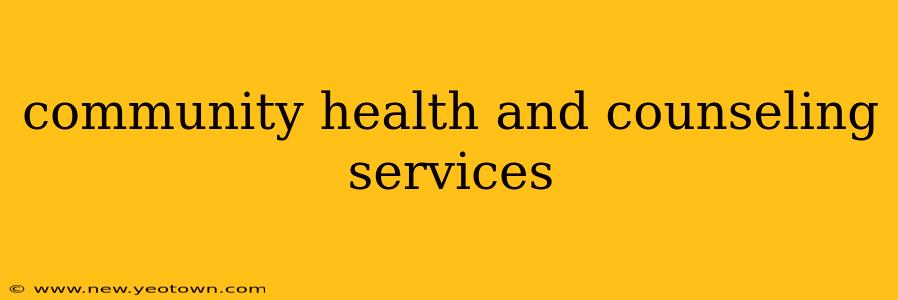Life throws curveballs. Sometimes, those curveballs leave us feeling lost, overwhelmed, or struggling to cope. Other times, entire communities face shared challenges that impact the well-being of everyone involved. This is where community health and counseling services step in – providing a vital lifeline for individuals and communities alike, offering support, guidance, and resources to navigate life's complexities. Let's delve into the crucial role these services play.
What are Community Health and Counseling Services?
Community health and counseling services encompass a broad range of programs and initiatives designed to improve the physical, mental, and emotional well-being of individuals and communities. They are often characterized by a holistic approach, recognizing the interconnectedness of physical and mental health and addressing the social determinants of health – factors like poverty, housing instability, and access to education – which significantly impact overall well-being. These services are generally accessible, affordable, or even free, emphasizing equity and inclusivity.
Think of them as a safety net, offering support when you need it most, whether it's managing a chronic illness, coping with grief, overcoming addiction, or navigating family conflict. They're a vital component of a healthy and thriving society.
What types of services are offered?
The services provided by community health and counseling centers are incredibly diverse, catering to a wide array of needs. A typical center might offer:
- Individual and group counseling: Addressing mental health concerns like anxiety, depression, trauma, and relationship issues.
- Substance abuse treatment: Providing therapy, medication-assisted treatment, and support groups for individuals struggling with addiction.
- Preventive health services: Screenings, vaccinations, and health education to promote wellness and prevent disease.
- Family and marital counseling: Helping families and couples resolve conflicts and improve communication.
- Case management: Connecting individuals with the resources they need, such as housing assistance, food banks, and job training.
- Community outreach and education: Raising awareness about health issues and providing support to vulnerable populations.
Who benefits from community health and counseling services?
The answer is simple: everyone. While these services are particularly crucial for individuals facing significant challenges, they benefit the broader community as a whole. Here are some examples:
- Individuals struggling with mental health issues: Providing access to therapy and support to manage symptoms and improve quality of life.
- Families facing conflict or crisis: Offering guidance and support to strengthen family relationships and navigate difficult times.
- People experiencing substance abuse: Providing treatment and support to overcome addiction and lead healthier lives.
- Children and youth facing challenges: Offering counseling, mentorship, and resources to help them thrive.
- Low-income individuals and families: Providing access to affordable or free health and counseling services.
- Communities facing health disparities: Addressing systemic inequalities that affect the health and well-being of certain populations.
How can I find community health and counseling services near me?
Finding the right services for your specific needs can be easier than you think! Many resources are available online and in your community. Start by searching online for "community health centers near me" or "mental health services near me." You can also contact your local health department, your primary care physician, or a social worker for referrals.
What are the benefits of using community health and counseling services?
The advantages of utilizing community health and counseling services are numerous and profound:
- Improved mental and physical health: Addressing underlying issues that impact overall well-being.
- Enhanced coping skills: Equipping individuals with strategies to manage stress and overcome challenges.
- Stronger relationships: Improving communication and building healthier connections with family and friends.
- Increased self-esteem and confidence: Helping individuals discover their strengths and potential.
- Greater sense of community: Connecting people with support networks and resources.
- Reduced healthcare costs: Preventing more serious health problems through early intervention and preventative care.
Are community health and counseling services confidential?
Confidentiality is paramount. Most community health and counseling services adhere to strict confidentiality standards, ensuring that your personal information is protected. However, there are exceptions, such as situations involving threats of harm to oneself or others. Always discuss confidentiality concerns with your provider to fully understand their policies.
How are community health and counseling services funded?
Funding for these invaluable services often comes from a mix of sources, including government grants, private donations, and fees for services. The specific funding model varies depending on the organization and location. Supporting these services through volunteering or donations is crucial for their continued operation and ability to serve the community.
Community health and counseling services are an indispensable part of a healthy and thriving society. They offer hope, support, and a pathway towards a brighter future for individuals and communities alike. Don't hesitate to reach out if you or someone you know needs assistance. The help is available, and it's often closer than you think.

